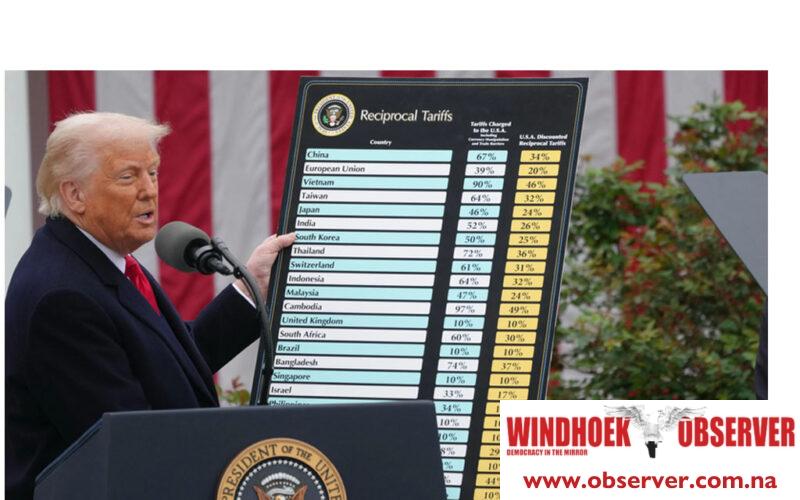CHAMWE KAIRA
The United States has imposed a 21% import tariff on Namibian goods, a move expected to affect key exports such as diamonds, uranium, fish, and beef.
U.S. President Donald Trump, in his announcement, cited the long-term decline in U.S. manufacturing as justification.
“From 1997 to 2024, the United States lost around five million manufacturing jobs and experienced one of the largest drops in manufacturing employment in history,” he said.
Namibia joins a list of African countries now facing higher tariffs on exports to the U.S.
These include Lesotho at 50%, Madagascar 47%, Mauritius 40%, Botswana 37%, South Africa 30%, Ivory Coast 21%, Nigeria 14%, Ghana 10%, and Kenya 10%.
The decision by Trump follows the recent suspension of USAID programmes in Namibia, which had already led to job losses and the disruption of health and development initiatives, including those focused on HIV/AIDS.
Additionally, last week, Namibia also announced that, effective 1 April the country no longer offers visa-free entry to US citizens.
US citizens now have to apply for a visa in advance through Namibia’s online visa-on-arrival portal.
Trump added that the loss of jobs in specific areas contributed to broader social challenges.
“Many manufacturing job losses were concentrated in specific geographical areas. In these areas, the loss of manufacturing jobs contributed to the decline in rates of family formation and to the rise of other social trends, like the abuse of opioids, that have imposed profound costs on the US economy,” he said.
Namibia became the first African country to export beef to the U.S. in 2020, with Meatco shipping 25 tonnes through the African Growth and Opportunity Act (AGOA).
AGOA is a USA trade program established in 2000 to promote economic growth in sub-Saharan Africa by providing eligible countries with duty-free access to that country’s markets for over 6 400 products.
By 2025, the country was exporting up to 5 000 tonnes of various beef cuts annually.
Other major exports to the U.S. include diamonds, valued at US$109 million in 2023, followed by building stone and fish fillets.
Political analyst Henning Melber said the impact was clear.
“The US imposes a 21% import tariff on Namibia. So much for all those who, during the initial weeks of Trump in office, shrugged their shoulders and publicly declared it had no impact on Namibia. Add this to the USAID disaster and continue to claim business as usual,” said Melber.
Economist Salomo Heii said the tariffs are regrettable and will serve as a major blow to global trade and, by extension, to the world economy.
“Remember that a great part of the production base of the US economy sits in the east, and if you look at a company like Nike or the likes of Apple, they have their manufacturing activities in the East, so what it means is that if you have commodities from the countries that you are imposing tariffs on, they could do the same to you. New economic policies tend to accompany a new administration,” he said in an interview with Namibia Future Media News.
Heii said Namibia has a large trade deal with the US economy.
“We export fish, beef, uranium, and diamonds. A tariff means it is more difficult for you to trade with that country. It will cost you more to land that product in your country. It strains trade relations globally, including with Namibia,” he said.
Heii suggested that Namibia should start looking for alternative markets.
“But it is easier said than done,” he said.
De Beers, which co-owns diamond mining operations in Namibia, said it is assessing the potential impact of the tariffs and will consult stakeholders to determine next steps.
Ethiopian-American businessman Zemedeneh Negatu said countries like Kenya, Ghana, and Ethiopia, which face lower 10% tariffs, may benefit through more competitive pricing.
On the other hand, he warned that countries hit with high tariffs could struggle to remain competitive in the U.S. market.
“Does AGOA matter anymore for Africa? Globalisation has entered a new uncharted era and African countries need to prepare,” said Negatu.
According to the Observatory of Economic Complexity (OEC), in 2023, Namibia exported US$130 million to the United States.
The main products that Namibia exported to the United States were diamonds ($109 million), building stone (US$8.25 million), and fish fillets (US$1.24 million).
In the same year, the United States exported goods worth US$239 million to Namibia.
The main products that the United States exported to Namibia were industrial fatty acids, oils and alcohols (US$19.6 million), magnesium carbonate (US$17.4 million), and rubber tyres (US$16.9 million).




